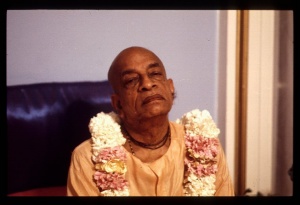SB 1.3.27: Difference between revisions
m (1 revision(s)) |
No edit summary |
||
| Line 1: | Line 1: | ||
{{info | {{info | ||
|speaker= | |speaker=Sūta Gosvāmī | ||
|listener=Sages of | |listener=Sages of Naimiṣāraṇya | ||
}} | }} | ||
[[Category:Srimad-Bhagavatam - Canto 01 Chapter 03]] | |||
[[Category:Bhagavatam Verses Spoken by Suta Gosvami - Vanisource|010327]] | |||
<div style="float:left">'''[[Srimad-Bhagavatam]] - [[SB 1|First Canto]] - [[SB 1.3: Krsna Is the Source of All Incarnations|Chapter 3: Kṛṣṇa Is the Source of All Incarnations]]'''</div> | |||
<div style="float:right">[[File:Go-previous.png|link=SB 1.3.26]] '''[[SB 1.3.26]] - [[SB 1.3.28]]''' [[File:Go-next.png|link=SB 1.3.28]]</div> | |||
{{CompareVersions|SB|1.3.27|SB 1962|SB 1972-77}} | |||
{{RandomImage}} | |||
==== TEXT 27 ==== | ==== TEXT 27 ==== | ||
<div | <div class="verse"> | ||
ṛṣayo manavo devā | :ṛṣayo manavo devā | ||
manu-putrā mahaujasaḥ | :manu-putrā mahaujasaḥ | ||
kalāḥ sarve harer eva | :kalāḥ sarve harer eva | ||
saprajāpatayaḥ smṛtāḥ | :saprajāpatayaḥ smṛtāḥ | ||
</div> | </div> | ||
| Line 17: | Line 23: | ||
==== SYNONYMS ==== | ==== SYNONYMS ==== | ||
<div | <div class="synonyms"> | ||
''ṛṣayaḥ''—all the sages; ''manavaḥ''—all the Manus; ''devāḥ''—all the demigods; ''manu-putrāḥ''—all the descendants of Manu; ''mahā-ojasaḥ''—very powerful; ''kalāḥ''—portion of the plenary portion; ''sarve''—all collectively; ''hareḥ''—of the Lord; ''eva''—certainly; ''sa-prajāpatayaḥ''—along with the Prajāpatis; ''smṛtāḥ''—are known. | |||
</div> | </div> | ||
| Line 24: | Line 30: | ||
==== TRANSLATION ==== | ==== TRANSLATION ==== | ||
<div | <div class="translation"> | ||
All the ṛṣis, Manus, demigods and descendants of Manu, who are especially powerful, are plenary portions or portions of the plenary portions of the Lord. This also includes the Prajāpatis. | All the ṛṣis, Manus, demigods and descendants of Manu, who are especially powerful, are plenary portions or portions of the plenary portions of the Lord. This also includes the Prajāpatis. | ||
</div> | </div> | ||
| Line 31: | Line 37: | ||
==== PURPORT ==== | ==== PURPORT ==== | ||
<div | <div class="purport"> | ||
Those who are comparatively less powerful are called vibhūti, and those who are comparatively more powerful are called āveśa incarnations. | Those who are comparatively less powerful are called ''vibhūti'', and those who are comparatively more powerful are called ''āveśa'' incarnations. | ||
</div> | </div> | ||
__NOTOC__ | |||
<div style="float:right; clear:both;">[[File:Go-previous.png|link=SB 1.3.26]] '''[[SB 1.3.26]] - [[SB 1.3.28]]''' [[File:Go-next.png|link=SB 1.3.28]]</div> | |||
__NOTOC__ | |||
__NOEDITSECTION__ | |||
Revision as of 13:36, 29 April 2021

His Divine Grace
A.C. Bhaktivedanta Swami Prabhupada
A.C. Bhaktivedanta Swami Prabhupada
TEXT 27
- ṛṣayo manavo devā
- manu-putrā mahaujasaḥ
- kalāḥ sarve harer eva
- saprajāpatayaḥ smṛtāḥ
SYNONYMS
ṛṣayaḥ—all the sages; manavaḥ—all the Manus; devāḥ—all the demigods; manu-putrāḥ—all the descendants of Manu; mahā-ojasaḥ—very powerful; kalāḥ—portion of the plenary portion; sarve—all collectively; hareḥ—of the Lord; eva—certainly; sa-prajāpatayaḥ—along with the Prajāpatis; smṛtāḥ—are known.
TRANSLATION
All the ṛṣis, Manus, demigods and descendants of Manu, who are especially powerful, are plenary portions or portions of the plenary portions of the Lord. This also includes the Prajāpatis.
PURPORT
Those who are comparatively less powerful are called vibhūti, and those who are comparatively more powerful are called āveśa incarnations.